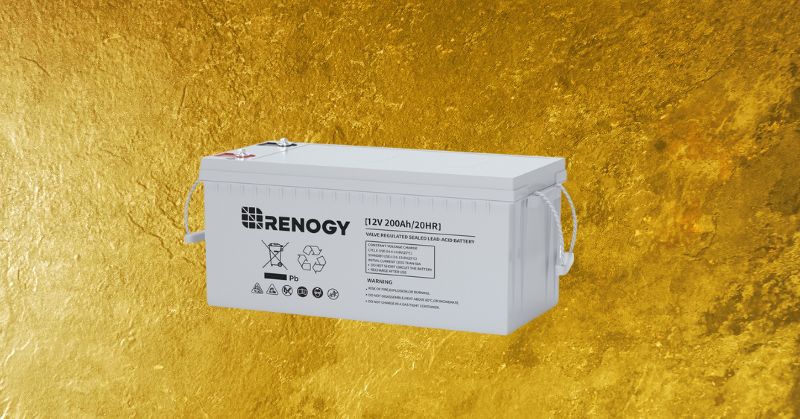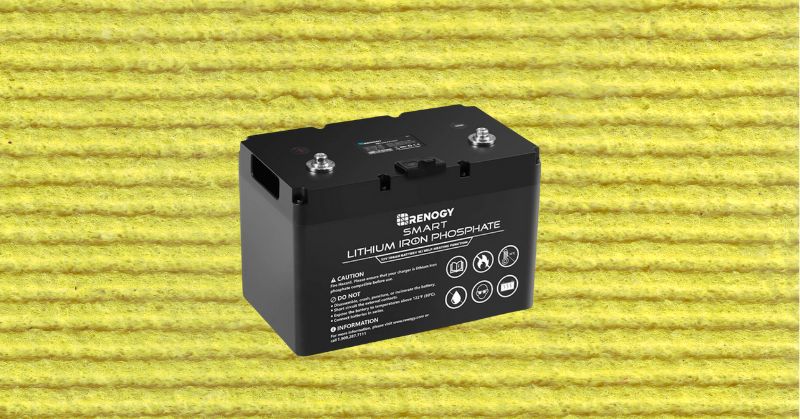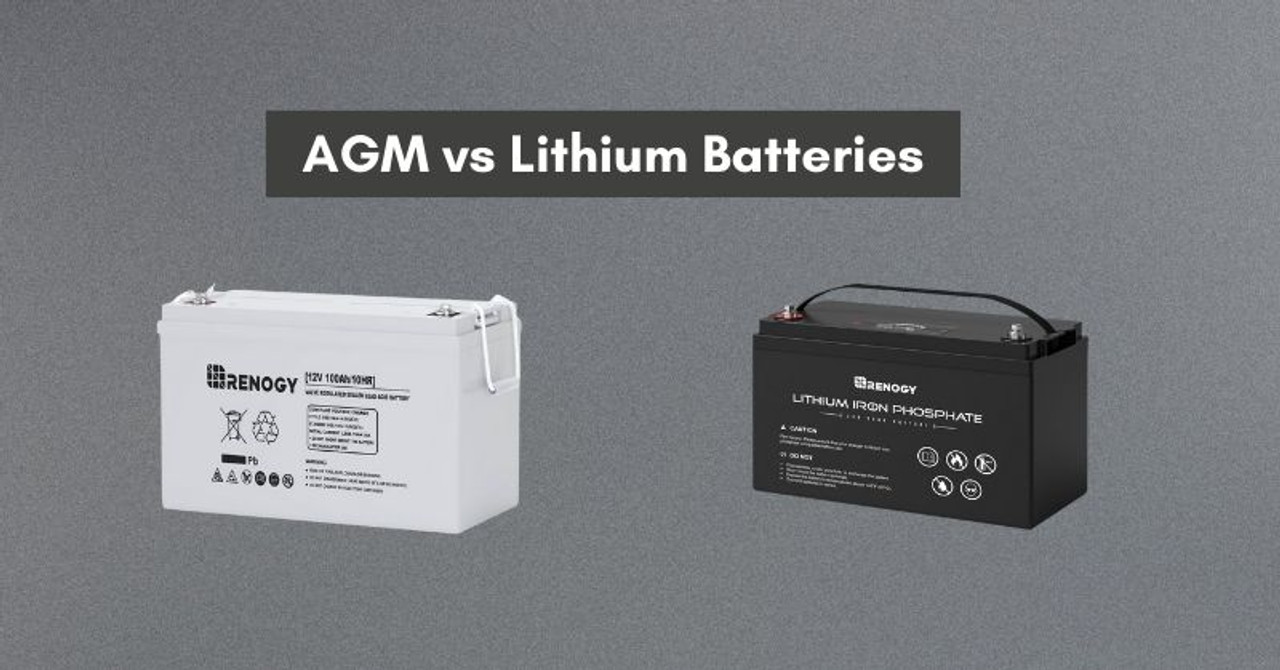AGM Battery vs Lithium Battery: Which Battery is Best for You?
Though a wide range of batteries is available on the market, not all batteries fully meet your requirements. Therefore, choosing the right battery for your applications is compulsory but a tough nut to crack.
Before you choose a battery, you should be familiar with your energy consumption requirements. Plus, you must know whether you need a battery with a long lifespan, higher energy capacity, higher energy density, advanced safety, and other similar factors. If you are not familiar with it, you can get assistance from professionals in this regard.
This article presents a comprehensive comparison of an AGM battery vs lithium battery. It lists the differences between both the battery types and helps you choose the right battery in the end.
What is an AGM battery?
It is an advanced version of a lead-acid battery. The word AGM is a short form of Absorbent Glass Mat. This battery uses sulfuric acid as an electrolyte. This electrolyte does not sit as a free-flowing liquid but is absorbed into the fiberglass mat. This process makes an AGM battery maintenance-free and spill-proof.
This battery type comes with a series of advantages over traditional batteries. An AGM battery is less likely to sulfate and holds the charge well. When it comes to mounting, AGM batteries support more flexible orientations because the liquid or electrolyte is sealed inside these batteries.
An AGM battery is an ideal choice for electric vehicles that need off-season storage. Simply put, an AGM battery can be used in various applications where a reliable and maintenance-free power supply is required, such as marine, renewable energy storage, backup power systems, and more.

What is a lithium battery?
A lithium battery is a popular rechargeable battery. In case you don't know what a rechargeable battery is, it can be charged and discharged multiple times to benefit from the storage energy. Batteries used in mobile phones, laptops, and cameras are rechargeable batteries. Lithium is used as an active material in lithium batteries.
Due to features like the ability to recharge hundreds of times, slow self-discharge ability, and higher energy density, lithium batteries offer a wide range of applications, such as emergency backup power, renewable energy storage, smartphones, portable power banks, tablets, alarms systems in remote areas, and more.
Higher energy density and lightweight design add more value to the credibility of lithium batteries and make them a perfect choice for electric vehicles and portable electronic devices. Different chemistries of lithium batteries are available on the current market. They include lithium iron phosphate (LiFePO4), lithium-ion (Li-ion), lithium polymer (LiPo), and more.

AGM battery vs lithium battery: What is the difference?
Now that you know what both batteries have to offer. It is time to get into the details of how they both are different from each other. We have listed some factors and compared both battery types based on them.
1. Energy density and size
The energy density of a lithium battery is much greater than its lead-acid counterpart. In fact, a lithium battery has the ability to store four times more energy compared to a lead-acid battery of the same size.
Having higher energy density means smaller battery size. You can get the same amount of power in less space, which is crucial in different applications like boats and RVs. Many people use this battery type due to its space-saving ability.
2. Lifespan of AGM battery vs lithium
An AGM battery usually comes with a lifespan of 3 to 5 years or charge cycles of 300 to 500. In comparison, lithium batteries come with much longer lifespans and can be used for 10 to 15 years without any significant degradation in their performance. The lifespan of lithium batteries in terms of charge cycles is between 4,000 and 15,000.
3. Maintenance
Low maintenance is required for both lithium and AGM batteries, but lithium technology-based batteries are slightly better than their counterparts in terms of maintenance.
Unlike flooded lead acid batteries, AGM batteries do not need routine watering. Still, they are sensitive to overcharging and undercharging. This process builds up hydrogen sulfide gas, which is pretty dangerous.
Moreover, AGM batteries may occasionally need equalization charging whereas lithium batteries don't need it.
4. Efficiency
AGM batteries are less efficient than lithium batteries. In terms of power, lithium batteries can store 10% more power compared to their AGM counterpart and other lead-acid batteries.
In addition, a lithium battery provides consistent power throughout its discharge time (from 100% to 1%). Moreover, on average, a lithium battery is charged 3 times faster than an AGM type battery.
When the conditions are extremely cold or hot, AGM batteries perform much better than lithium batteries. Therefore, prefer using AGM batteries if you live in similar conditions.
5. Safety
Lithium batteries are safer to use than AGM batteries. Suppose you are sleeping close to a battery bank in your RV. An indoor AGM battery can build up hydrogen gas due to improper ventilation. This gas causes breathing problems.
Therefore, if you have installed an AGM battery in your RV, don't forget to ensure it is close to the ventilation section. On the other hand, a lithium battery does not produce the hydrogen gas.
6. Weight
Due to higher energy density, lithium batteries can store more energy in a smaller sized structure, as discussed above. On average, the weight of a lithium battery is three times less than the AGM battery. For example, the weight of a 12V 100Ah AGM battery is up to 70 pounds, whereas a lithium battery with the same specifications weighs only up to 21 pounds.
7. Cost
Apparently, the cost of lithium batteries is higher than AGM batteries. It can be 4 times higher in some cases. However, the great difference between the prices of both batteries is due to the higher energy density, longer life cycle, and other similar factors associated with lithium batteries.
Application comparison of AGM vs lithium battery
Now that you have assessed the performance of both battery types considering different factors, such as energy density, weight, size, and cost. It is time to explore how these batteries perform for different applications.
1. PV systems
Lithium batteries are a better choice to use with solar systems due to their unmatched abilities, including but not limited to longer lifespan, greater efficiency, more capacity, and fast charging.
In comparison, an AGM battery can be used where you need a more affordable energy storage solution. If you are looking for a highly efficient and long-lasting battery for your solar energy system, explore the widest solar battery at Renogy.
2. Marine
Due to the constant movements of marine, conventional gel or liquid batteries are not suitable for marine applications. On other hand, most lithium batteries do not come with the liquid inside; therefore, they are a better choice for marine applications compared to AGM batteries.
3. Recreational vehicles
In terms of performance and efficiency, lithium batteries are better for RVs due to their lightweight structure, compact size, and long lifespan. If you are on a budget, AGM batteries could be the suitable option in this case because they provide you with a cost-effective solution.
To choose the right battery for your recreational vehicle, you should consider factors like lifespan, performance, initial cost, and more.
4. Freezing conditions
Charging a battery can be a challenging job at low temperatures. This is where AGM batteries are better than their lithium counterparts. However, advanced lithium batteries come with self-heating functions to give performance closer to AGM batteries in freezing conditions.
AGM vs lithium-ion: Which battery is right for you?
Well, both batteries are good and a choice for millions of people worldwide. However, the choice may vary depending on your needs. For example, if you are looking for a more reliable battery with an enhanced lifespan, higher energy density, lightweight structure, and compact size, you should choose a lithium-ion battery.
On the other hand, if you have a tight budget and are looking for an affordable energy storage solution, go for AGM batteries. Plus, if you want to install a battery in an extreme hot or cold environment, you should prefer an AGM battery over its lithium alternative. This is how you can make the right selection.
Conclusion
Out of all the batteries available on the market, lithium and AGM batteries have a special place. Both perform well for different requirements and in different conditions. The discussion above has presented a detailed comparison of AGM battery vs lithium battery.
The performance, lifespan, charging time, and other parameters of lithium batteries are better than AGM batteries, but lithium batteries are costly due to their unmatched functionalities. On the other hand, AGM batteries are budget-friendly but are not as safe as lithium batteries.
If you need safer batteries with longer lifespans for your home or commercial solar system, don't miss exploring the best Renogy battery.
FAQs
Are AGM batteries better than lithium?
Not in every aspect, but AGM batteries perform well in extreme cold or extreme hot conditions. Plus, they are more affordable than lithium batteries. On the other hand, the prices of lithium batteries are higher but they come with much longer lifespans of up to 15 years on average.
What is the difference between 100Ah lithium and 100Ah AGM batteries?
The voltage rating of a 100Ah lithium battery is 12.8V, whereas the same rating of an AGM battery is 12V. It becomes 1280 Wh for a lithium battery and 1200 Wh for an AGM battery of the same type. In addition, the lifespan of a 100Ah lithium battery can be up to ten years, whereas two 100Ah AGM batteries collectively provide a similar life cycle. Moreover, the size of a 12V 100Ah lithium battery is compact compared to a 12V 100Ah AGM type battery.
What is the disadvantage of AGM batteries?
The prominent disadvantages associated with AGM batteries include longer charging times, less capacity, and shorter lifespan. In addition, these battery types are sensitive to high voltages and overcharging. Moreover, an AGM battery needs full charging between uses. It makes them not a great choice for applications where it is impossible to keep the battery fully charged.
Can I replace my AGM battery with a lithium battery?
Yes, you can replace your AGM battery bank with lithium batteries because they last longer and offer higher energy density with shorter charging times. Remember, lower-capacity lithium batteries can provide you with the same amount of power and energy as two AGM batteries do. One thing you should keep in mind is the battery charger, solar regulator, and the battery management system.











